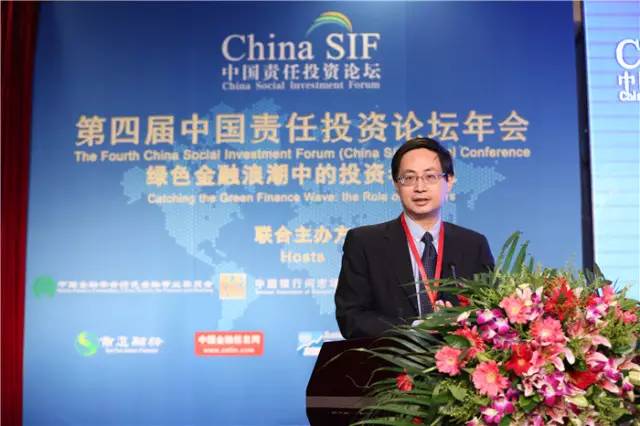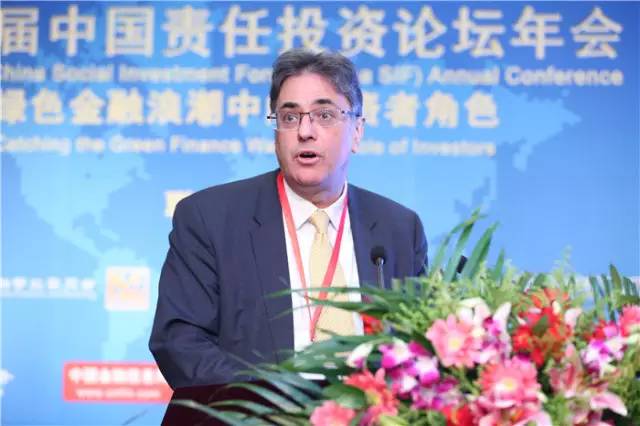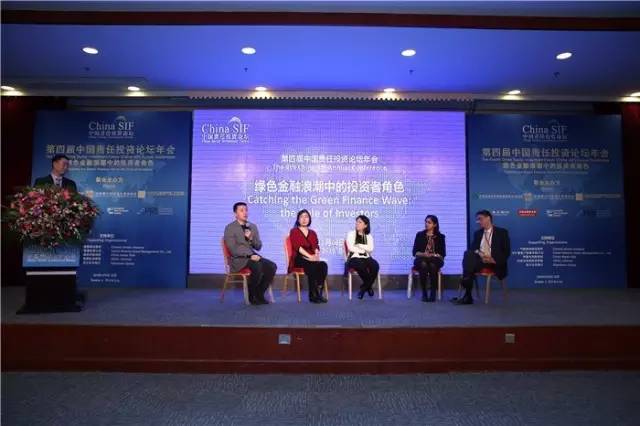The Fourth China Social Investment Forum (China SIF) Annual Conference “Catching the Green Finance Wave: the role of investors” was held in Beijing on December 6, 2016. Participants had deep conversations on topics of establishing China's green investor network, green bond market development, green investment practices and green investment of insurance companies, etc.
The conference invited regulators, investors and other key stakeholders to have discussions on the role of investors in the green finance wave, aiming to inspire more Chinese green investors. The co-hosts of the event are: Green Finance Committee, China Society of Finance & Banking, National Association of Financial Market Institutional Investors (NAFMII), Insurance Asset Management Association of China (IAMAC), SynTao Green Finance, China Finance Information Network, UN Sustainable Stock Exchange (SSE) Initiative and UN Principles for Responsible Investment (PRI). Dr. Guo Peiyuan, the chairman of SynTao Green Finance, moderated the conference.

Guo Peiyuan as the moderator of the conference
Ma Jun, the chief economist of the Research Bureau of the People's Bank of China and the chairman of Green Finance Committee, China Society of Finance & Banking, emphasized the significance of green investors in the development of green finance. Greening investors can drive target companies to participate more in green economic activities, which is also in line with the investors’ own long-term interests.

Ma Jun delivers opening speech
Mr. Ma Jun gave five suggestions on the cultivation of green investors in China, including to strengthen the concept promotion of green investment and responsible investment; to gradually integrate ESG (environment, social and governance) factors in investment strategy; to improve environmental information disclosure of institutional investors; to establish a green investor network and the mandatory disclosure of environmental information for listed companies and corporate bonds.

Feng Guanghua delivers opening speech
Feng Guanghua, the Deputy Secretary-General of NAFMII, said that by the end of November, the scale of debt financing instruments issued by green enterprises at NAFMII platform was more than 150 billion yuan. The total registered amount of labeled green debt financing instruments was than 17 billion yuan and the issued amount reached 8 billion yuan. Nominated projects of registered green debt financing instruments were expected to save 1.64 million tons of coal equivalent, reduce 4.88 million tons of CO2 emissions each year. The effect of energy-saving and emission reduction is very significant.
Mr. Feng pointed out that a variety of innovative green debt financing instruments had registered at NAFMII. NAFMII continued to promote the drafting and improvement of green debt financing instruments guidelines and solicited opinions from more than 40 members of the market. NAFMII had also supported the development of a green debt instrument list system to make the operation more convenient. NAFMII would publicly launch the system to the market soon.

Cao Deyun delivers opening speech
Cao Deyun, the executive vice president and secretary general of IAMAC, stated that in recent years, China's insurance asset management industry has always implemented the concept of responsible investment and green development. The number of green industry related projects was more than 180, accounting for 33% of the total number; the scale of investment has exceeded 500 billion yuan, accounted for 40% of the total amount. The projects covered a number of areas, such as clean transportation, clean energy, resource conservation and pollution control.

Sagarika Chatterjee delivers keynote speech
Sagarika Chatterjee, PRI’s associate director of policy and research, introduced four factors to promote green investment, including long-term investment, risk aversion, client request and strategic policy signals. She suggested that investors and policy makers should have better cooperation to promote the flow of green funds and investment practice, as well as to build capacity to enhance China's green finance development.

Bruno Weill delivers keynote speech
Bruno Weill, the vice chairman of BNP Paribas (China), and Priscilla Lu, the managing director and head of sustainable investments Asia, Deutsche Asset Management, both mentioned that they were looking forward to the development of green finance in China. Mr. Weill introduced the green investment practices of BNP Paribas, for example, that they are not only financing for the energy providers, but also provide financial support to energy users, including energy storage, smart grid, energy transport, and families. He also mentioned the importance of risk assessment and information disclosure and considered that responsible investment is changing the business model.

Priscilla Lu delivers keynote speech
Dr. Lu mainly talked about the responsible investment practice of Deutsche Asset Management. The company uses professional software and has a whole team on corporate ESG assessment. She believed that the future business model would attach great importance to ESG, and investment experts could use it to make better decisions.

Yang Yuebin delivers keynote speech
Yang Yuebin, the fund manager of AIFMC Green Investment Hybrid Securities Investment Fund of AEGON-INDUSTRIAL Fund, which is the first mutual fund company to introduce the concept of socially responsible investment and green investment in China, introduced the company’s investment philosophy. The target pool is categorized as "dark green" and "light green”. The traditional environmental protection industry belongs to the dark green industry, while traditional industries can still in green investment range. Industries, such as hydropower or thermal power, which focus on energy saving, carbon or sulfur emission reduction, as well as shareholder return and social responsibility, can be included in the "light green" level.

An Guojun delivers keynote speech
Dr. An Guojun, the vice secretary of the Green Finance Committee, China Society of Finance & Banking, pointed out the importance of establishing various types of market-oriented green development funds. The government needs to play a leading role to make more market capital transfer to the environmental protection industry, which can promote environmental protection business. PPP model of green development fund is very important to promote the development of the industry, and it can effectively support green credit. Dr. An suggested that guarantee funds could solve the difficulty of financing environmental protection enterprises, especially small and medium sized enterprises.

Guest speakers answer questions from the audience
In the afternoon, parallel discussions were held on four topics: "how to invest green bonds”, “stock exchange and ESG information disclosure”, “how to invest green stock" and "ESG risk assessment and management".

Parallel discussion I
The first parallel discussion, co-hosted by Orient Minerva Asset Management Co Ltd and Climate Bonds Initiative (CBI), focused on “Fast growing green bond market”. The discussion was moderated by Raymond Zhang, the managing director of SynTao Green Finance. Panelists of the discussion included: Xia Yang, the vice general manager of Orient Minerva Asset Management Co Ltd; Xu Guang, the executive director of Financial Innovation Promotion Dept. of National Association of Financial Market Institutional Investors (NAFMII); Sean Kidney, the CEO of CBI; Ricco Zhang, the director of Asia Pacific of the International Capital Market Association (ICMA); Li Rui, the director of structured finance of Investment Banking Dept. of Shanghai Pudong Development Bank; and Chen Daidi, the general manager of the research department of China Bond Rating Co Ltd.
Mr. Xia Yang delivered a welcome speech on behalf of the hosts, then Mr. Sean Kidney and Mr. Xu Guang respectively introduced the recent progress of international green bond market, and the development of green debt financing instruments in interbank market. In the roundtable discussion, the panelists had a discussion around the topic of how to encourage investors to invest in green bonds. Measures proposed included establishing "green bond investors ranking", gradually introducing foreign institutional investors as the opening up of the bond market, setting up bond funds of green theme and making investors aware of the value of third party assessment of green bond, etc.

Parallel discussion II
The topic of the second parallel discussion was “Sustainable stock exchanges and ESG disclosure”. The discussion was moderated by Chen Zhouyang, the chief editor of Green Finance Channel of China National Financial Information Network. Panelists of the discussion were: Wang Junxian, researcher of China Institute of Finance and Capital Markets (CIFCM); Chen Zheng, researcher of research institute of Shenzhen Stock Exchange; Sun Yan, researcher of research institute of Shanghai Stock Exchange; Jon Edwards, the chief representative of Beijing Representative Office of London Stock Exchange Group; Xu Xiaoling, the chief Editor of CSR report editorial office of CNPC Economics & Technology Research Institute; and Liu Xia, CSR Dept. of China Industrial Bank.
Dr. Sun Yan and Dr. Chen Zheng respectively introduced the practices and characteristics of ESG information disclose of listed companies in Shanghai Stock Exchange and Shenzhen Stock Exchange. Jon Edwards introduced that the London Stock Exchange had launched a low-carbon data model to measure green income and its percentage of total revenue of more than 13.4 thousand companies. Wang Junxian said that she hoped environmental information disclosure system was not only mandatory in the future, but also the demand of a developed market, which would guide the sustainable development of the capital market. Two listed companies respectively introduced their practices of information disclosure and experiences of engaging ESG information with investors.

Parallel discussion III
The third parallel discussion focused on “Responsible investor and green stocks”. The discussion was moderated by Kelly Yu, the China Representative of UNEP Inquiry. Panelists included: Robert Eccles, the chairman of Arabesque Partners and the professor of Harvard Business School; Timothée Jaulin, Investment Solutions Engineering of Amundi Asset Management; Sabrina Zhang, the director of CDP China; Caroline Li, the equity market specialist of Bloomberg; and Wang Jiangchuan, the partner of Jiangshan Investment.
Timothée Jaulin introduced how to manage climate risks in the portfolio. Professor Eccles explained that how Arabesque Partners integrate sustainability and ESG information into its analysis model. In the roundtable discussion, Ms. Sabrina Zhang and Ms. Caroline Li both stressed the investor's increasing demand on ESG information. And Mr. Wang Jiangchuan emphasized that Chinese investors need companies with good social responsibility performance to have better financial performance as well.

Parallel discussion IV
The fourth parallel discussion was co-hosted by China Water Risk, ISEAL Alliance and Rabobank, with the topic of “Quantifying and managing ESG Risks”. The discussion was moderated by Debra Tan, the director of China Water Risk. This parallel discussion was mainly about how to better quantify and manage ESG risks.
Ms. Debra Tan presented the evaluation on water risk of ten largest listed energy companies and more than 70 professional investors from three aspects--shadow pricing, exposure to water stress and regulatory risks. Ms. Kristin Komives introduced that ISEAL Alliance provided global sustainability standards to the operation and practices of the finance sector. Mr. Bill Yu’s speech focused on the practices of launching sustainable finance business by Rabobank. Mr. Lu Wenqin introduced the Environmental Benefit Analysis System, developed by CECEP Consulting Co., Ltd, which can be used to calculate the corresponding environmental benefit data by simply inputting the basic parameters. Mr. Kong Shenglong stated that the main work of the Global Infrastructure Basel (GIB) Foundation, which was developing global standards for infrastructure construction. The standard would help investors to identify sustainable infrastructure, thus to promote the sustainability of infrastructure construction.
Click here to see original report: http://greenfinance.xinhua08.com/zt/2016/zerentouzi/#g1674381=1